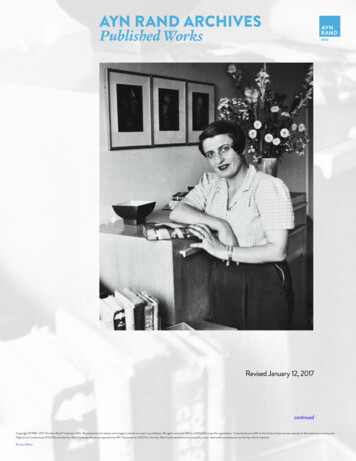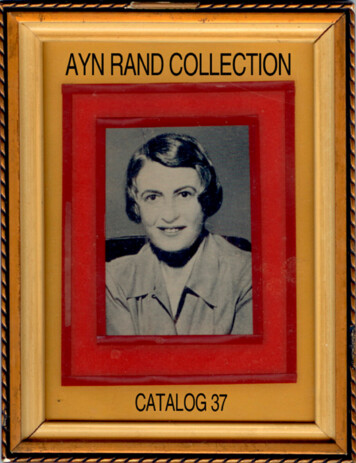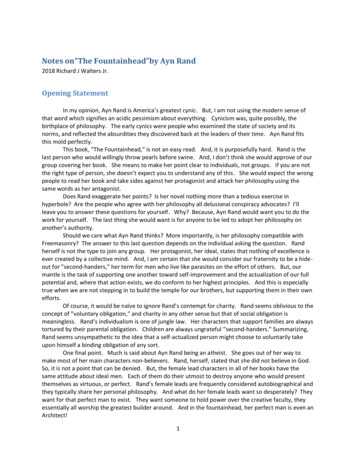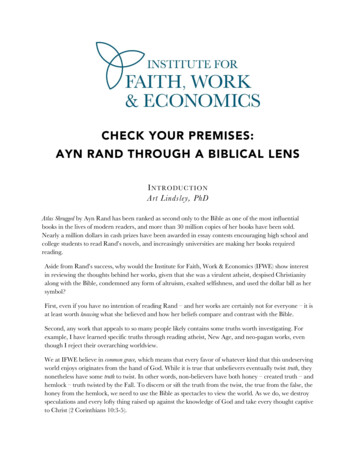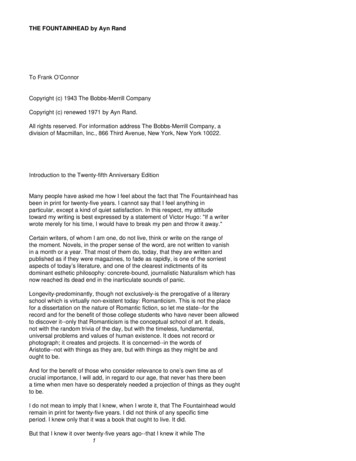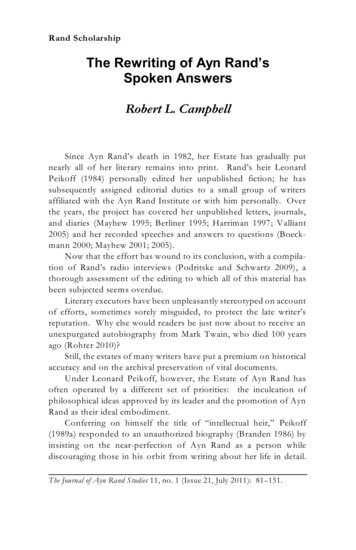
Transcription
Rand ScholarshipThe Rewriting of Ayn Rand’sSpoken AnswersRobert L. CampbellSince Ayn Rand’s death in 1982, her Estate has gradually putnearly all of her literary remains into print. Rand’s heir LeonardPeikoff (1984) personally edited her unpublished fiction; he hassubsequently assigned editorial duties to a small group of writersaffiliated with the Ayn Rand Institute or with him personally. Overthe years, the project has covered her unpublished letters, journals,and diaries (Mayhew 1995; Berliner 1995; Harriman 1997; Valliant2005) and her recorded speeches and answers to questions (Boeckmann 2000; Mayhew 2001; 2005).Now that the effort has wound to its conclusion, with a compilation of Rand’s radio interviews (Podritske and Schwartz 2009), athorough assessment of the editing to which all of this material hasbeen subjected seems overdue.Literary executors have been unpleasantly stereotyped on accountof efforts, sometimes sorely misguided, to protect the late writer’sreputation. Why else would readers be just now about to receive anunexpurgated autobiography from Mark Twain, who died 100 yearsago (Rohter 2010)?Still, the estates of many writers have put a premium on historicalaccuracy and on the archival preservation of vital documents.Under Leonard Peikoff, however, the Estate of Ayn Rand hasoften operated by a different set of priorities: the inculcation ofphilosophical ideas approved by its leader and the promotion of AynRand as their ideal embodiment.Conferring on himself the title of “intellectual heir,” Peikoff(1989a) responded to an unauthorized biography (Branden 1986) byinsisting on the near-perfection of Ayn Rand as a person whilediscouraging those in his orbit from writing about her life in detail.The Journal of Ayn Rand Studies 11, no. 1 (Issue 21, July 2011): 81–151.
82The Journal of Ayn Rand Studies Vol. 11, No. 1 (Issue 21)Two other unauthorized volumes have now been published (Burns2009; Heller 2009); the closest thing to a full-length authorizedproduction, by literary scholar Shoshana Milgram, still has noannounced date of publication. And to justify his role in casting outdissenters, Peikoff (1989b) proclaimed the inherent dishonesty ofvirtually any system of ideas not identical to Rand’s philosophy asinterpreted by himself.Pronouncing Objectivism a “closed system,” Peikoff (1989b;1993) has, on the one hand, identified it with the philosophical ideasexpounded by Rand during her lifetime, no more and no less. He hasstaked his legitimacy on transmitting what she taught him, unmediatedby any intellectual contribution or significant interpretation of hisown.On the other hand, Peikoff (1989b; 1993) has put himself forwardas the authoritative interpreter of Rand’s actual meaning, not tomention the ultimate arbiter of what will be presented in the AynRand Institute’s extensive education, training, and outreach programs.If her literary executor’s chosen mission is even approximatelywhat I have described, aspects of this mission might trump historicalaccuracy—or even the special significance with which her followersinvest Ayn Rand’s words—when it comes time to ready her previously unpublished material for release. An off-the-cuff remarkpreserved on a recording might, on occasion, come into conflict withthe image that Peikoff has projected of her. Some extemporaneouscomment might contradict a tenet in the received interpretation of herthought, or refer to a person with whom she later had a falling out, orpoint to unexpected historical contingencies, or reveal some smallaspect of her character of which her heir has preferred not to speak.Rand the UnchangingWhat appears to be the Estate’s vision has been starkly enunciatedby Peikoff’s associate James Valliant (2010):Compared to most other thinkers, compared even to themost consistent of them, Rand was a rock of intellectualchangelessness and consistency in a tumultuous sea. Fromher ideas about religion, to her taste in literature, to her lovefor America, it’s actually hard to find any sharp “elbows” in
Campbell — Rewriting Rand’s Spoken Answers83Rand’s thought of any kind beyond the stylistic adjustmentto differing venues for her thought.[. . .] The process of Rand’s development was largely theprocess of finding the right words to express her originalintention and the language to fit her unique vision withprecise clarity.The Estate may be concerned to present a Peikoff-approved Rand,one who, as far as the eye could see, subscribed to the very same totalphilosophy that Peikoff taught under her sponsorship and haspromoted since her death. This would be a Rand who never changedher mind about anything or anyone important, a Rand historicallyunsituated, a Rand free of transitory, potentially embarrassingsentiments or associations.In a response to Valliant, Jennifer Burns (2010) wrote that forhim:language does not precisely express concepts or meaning: ifRand changed the language she used, it was not because herideas changed but because she simply expanded the repertoire of words she had at her disposal.From Valliant’s position it might be taken to follow that wheneverRand’s words stray from the Peikovian ideal, it isn’t her thoughts thathave deviated. Her words simply stand in need of correcting.To be fair, Rand occasionally lent her own voice to thisunchanging-thinker chorus. Consider the boast with which she ledoff a Q&A session at the Ford Hall Forum:Q: In the last 25 years, have you had an important change ofopinion?A: Oh, I think you make it too restricted. Put it this way: inthe last 64 years, I have not [lengthy applause]—not philosophical opinions. If you understand the term, that isfundamental views of the nature of man, of existence, and ofthe means of human knowledge and human values.
84The Journal of Ayn Rand Studies Vol. 11, No. 1 (Issue 21)I certainly have learned a great deal in these years and in thelast 25 years, and I have improved very frequently someformulation, some details of the conclusions which I reached,but never the philosophy nor the fundamentals. (Ford HallForum 1969, 2:07–3:23)1At the age of 64, Rand was expecting her audience to believe thatshe had been subscribing to the very same philosophy since birth.And in other spoken answers, to be discussed below, she refrainedfrom indicating her one-time devotion to Friedrich Nietzsche andfrom acknowledging that a single American nonfiction writer influenced her thinking between 1926 and 1946.The Editing of Ayn Rand AnswersStanding in the way of any editorial assessment, however, hasbeen the Estate’s policy of restricting access to the Ayn RandArchives and the archival subcollection of Ayn Rand Papers. Withrare exceptions (historian Jennifer Burns being the most notable), thedocuments and recordings housed in the Archives have been availableonly to those affiliated with the Ayn Rand Institute or operating underthe direction of Leonard Peikoff. Few of those who might beinterested in comparing the edited treatments with the uneditedoriginals have been in a position to do it.What’s more, those who are granted access to the originaldocuments in the Ayn Rand Archives must receive permission fromthe Estate to quote from them. So past documentation of discrepancies between the originals and the edited versions has had to rely onspot comparisons with prior publications of the same material (ashappened with a few of Rand’s journal entries; Sciabarra 1998) or, forthose who have been granted access to the Archives, it must belimited to those examples for which permission to quote has beengiven (Burns 2009).There is an exception, however. Many of the question andanswer periods that followed Rand’s public speeches or lectures areavailable to the public in recorded form. The Ayn Rand Bookstoresells them on compact disks. Some, in turn, are also available asstreaming audio on a website maintained by the Ayn Rand Institute.2Anyone who wishes to go to the trouble can therefore make
Campbell — Rewriting Rand’s Spoken Answers85detailed and extensive comparisons between Rand’s actual words andthe renditions in a book that was edited for the Estate by philosopherRobert Mayhew and published under the title Ayn Rand Answers: TheBest of Her Q&A.Mayhew’s own statement, in the introduction to Ayn RandAnswers, makes a prima facie case that such comparisons are needed:Given the extemporaneous nature of the material, it is notsurprising that the transcripts required editing—as Ayn Randherself suggested they would. At one point during her 1969nonfiction-writing course, she said that she was a writer, nota speaker, and that she did not speak well extemporaneously.Someone replied that she should listen to her answers toquestions. She responded:“That depends on whether the question is interesting. If it’sa proper question, so that I know the context from which it’sasked and I know it’s worth answering, that is very inspiring.Sometimes, I may give an answer that’s almost publishable— but not quite. It might be good for a first draft, but itwould still need editing.” (Mayhew 2005, x)Mayhew appears to be saying that Rand’s own words needed a lotof improving. The reader would be inclined to presume that he didn’tfail to supply it.Recently Burns, after examining original documents housed in theArchives, has generally described several Estate-produced volumes—Boeckmann (2000), Mayhew (2001; 2005), and Schwartz andPodritske (2009)—in the following terms: “These books are derivedfrom archival materials but have been significantly rewritten” (2009,293).Consequently, I have set out to investigate the following issuesconcerning Ayn Rand Answers: What were Rand’s original words, and how faithful was Mayhewto them? When Mayhew made changes, what was the rationale for them(when this can be determined)? Did Mayhew’s editing express Rand’s meaning more clearly than
86 The Journal of Ayn Rand Studies Vol. 11, No. 1 (Issue 21)she had when speaking? Did he improve in any other way on theoriginals?Finally, did this editing tend to promote a Peikoff-approvedimage of an unchanging thinker?I was able to work with a fairly large data set (it is more fullydescribed in Appendix A). It allowed me to check the originals of 201out of the 370 answers published in the Mayhew volume, or 54% ofthe items appearing there. It also allowed me to check 92 answersthat Mayhew chose not to use (I can’t say what the percentage is of allof the unused answers, because I have not been able to checkMayhew’s remaining sources, as itemized in Appendix B).Mayhew’s Editorial ProcedureMy research has shown that Mayhew’s editing rarely left a wholesentence untouched. He rewrote nearly everything that Rand said.Many of Rand’s answers were sharply abridged, and not on accountof obvious repetitiveness. Mayhew also divided long or multi-sectionanswers into separate items; wrote a new question for a section of ananswer that he chose to present on its own; and rearranged parts ofan answer internally.Mayhew routinely substituted words or expressions that suited hispersonal taste for those that Rand was in the habit of employing.Where Rand liked to say “has to,” he overwhelmingly preferred“must.” In place of “Negro,” he put “black.” Readers of Ayn RandAnswers may come away with the impression that her productivevocabulary included “owing to,” “the agent,” “legalize,” “exit poll,”and “critique”—even though none of these are known to have figuredin Rand’s speaking or writing.Mayhew’s broader insensitivity to verbal nuance is frequently ondisplay: a country is “Red” instead of “wrecked,” “bother” is changedto “bother with,” “expand” morphs into “extend.” A device to whichMayhew turns again and again is putting emphasis on single words,unsupported by anything in Rand’s diction or intonation.An entirely different problem arose on a few occasions whenMayhew borrowed a bit of editing from another source—and failedto let his readers in on it. Unbeknownst to the reader, 14 of the 370answers in Mayhew’s book were actually edited by Rand herself.
Campbell — Rewriting Rand’s Spoken Answers87Mayhew did not publicly reveal this fact until nearly 5 years after hisbook had gone on sale.Most seriously, Mayhew tampered with some answers. Heremoved references or allusions to persons who did not remain ingood odor with Rand or, subsequently, with Peikoff; he cut outdiscussions of potentially embarrassing biographical issues, such as themorality of amphetamine use; he avoided expressions of opiniondeemed inconsistent with Peikovian Objectivism, such as hercomments about the TV show “Charlie’s Angels.” Some answers thatMayhew chose not to use at all appear to have been excluded forcomparable reasons.To support my evaluation of Mayhew’s editing, I will comparefresh transcriptions of Rand’s spoken words with Mayhew’s publishedrenditions. Such comparisons can be tedious and space-consuming,so I have had to be selective. But I have provided enough extendedexamples to illustrate all of the salient characteristics of Mayhew’sediting.My transcriptions are purposely raw; they include all of Rand’shesitation pauses, false starts, and other disfluencies, as well asaudience reactions and interjections by the moderator. When I quotefrom them, I present her words completely unedited. I have notadopted this policy because I think a book ought to consist oftranscriptions so raw as these. Rather, it is because accurate transcriptions are the starting point for such a publication as Ayn Rand Answers,and providing them here will help readers get as close to the sourcematerial as possible.Mayhew has conspicuously never taken credit for the transcriptions he used in Ayn Rand Answers. He invites the inference thatmany, if not all, were the work of other hands. One wonders whetherhe even did much listening to the recordings while preparing hisvolume. Such inattention is particularly unfortunate where Rand isconcerned, because she was a native speaker of Russian, not ofEnglish. An able transcriber can help the wider English-speakingaudience past such pronunciations as vwoter for “voter,” awoid for“avoid,” apprahpriate for “appropriate,” warrld for “world,” Rrreegan fora political figure she disliked, and a “live” that is scarcely distinguishable from “leave.” The misheard words that dot Mayhew’s volumewere most likely contributed by transcribers not fully used to Rand’s
88The Journal of Ayn Rand Studies Vol. 11, No. 1 (Issue 21)Russian accent.The Answers Mayhew UsedOf the 286 answers I was able to transcribe from recordings (seeAppendix A for details about sources), Ayn Rand Answers includes194, or just over two-thirds. After a degree of cutting, pasting, andrearranging, these 194 original answers appear as 201 published items.Mayhew devoted all of two sentences to explicating his overallpolicy in editing Ayn Rand Answers: “Most of the editing I didconsisted of cutting and line-editing to bring the material closer to thelevel of conciseness, clarity, and smoothness appropriate to a writtenwork. Very little had to be cut owing to repetition” (2005, x).From Mayhew’s standpoint, the original answers must never havebeen sufficiently concise, clear, or smooth. He rewrote nearly all ofthem.Cutting Up and RearrangingAmong the procedures that Mayhew employed, but did not seefit to acknowledge in his introduction, were dividing long or multisection answers into separate parts; providing new questions forsections of an answer that he chose to present on their own; andrearranging parts of an answer internally.For instance, Rand made guest appearances after 8 of the lecturesin Peikoff’s 1976 series on The Philosophy of Objectivism. After Lecture7, she was asked to comment on the just-concluded presidentialelection. The original questions were these three (all had beensubmitted in writing, so Rand read them out loud to her audience):Do you have any comment to make on the result of thepresidential election? Why did Ford lose? (Lecture 7, CD 2,Track 5, 12:35–14:25, CD 3, Track 1, 0:00–0:28)Uhh, can it be that the sense of life reactions of the votershave changed so much over four years, or is it mostly, or100%, the fault of Gerald Ford for evading the basic issues?Will the Republican Party have any role to play in defendingcapitalism, or must the issue be fought entirely on thecampuses, newspapers, and in the professions? (CD 3, Track
Campbell — Rewriting Rand’s Spoken Answers891, 0:29–12:57)What signs should we watch for in the Carter administration,in terms of the more dangerous policies he might adopt?And what do we do now? (CD 3, Track 1, 12:58–14:55)Mayhew rewrote the questions to suit his mild cutting andextensive reshuffling of 17 minutes of spoken material. Here are thefour questions à la Mayhew:Could you comment on the 1976 Presidential election? Whydid Ford lose? What do you expect from Carter? (2005, 69–70)Could you comment on Ronald Reagan and his role in the1976 presidential election? (70–71)Has the sense-of-life reaction of Americans changed so muchsince the 1972 election? (71)Will the Republican Party have a role in defending capitalism? (52–53)Rand went to considerable lengths to blame Reagan for undercutting Ford’s campaign. Because none of her questioners had broughtReagan up, Mayhew apparently felt a need to create a new question ofhis own.On occasion, Mayhew took answers to different questions andconsolidated them. At her 1969 Ford Hall Forum appearance, Randgave long answers to two different questions about the Vietnam WarMoratorium marches (22:07–28:42, 30:55–36:45). After much slicingand reassembly, Mayhew presented these as a single item (2005,92–93).On other occasions, he took a single answer and rearranged itinternally. Half of Rand’s question and answer period after Philosophy:Who Needs It? was occupied with a single exchange over racism, theinternment of Japanese-Americans during World War II, the enslavement of African-Americans, and the ill treatment of Native Americans
90The Journal of Ayn Rand Studies Vol. 11, No. 1 (Issue 21)(9:27–23:01). Mayhew (2005, 102–4) took 13 minutes of spokenmaterial that fills 19 paragraphs of raw transcription, deleting Rand’sfirst two paragraphs and her last two, cutting most of her 8th through10th, and moving her relatively brief remarks about the confinementof Japanese-Americans in concentration camps all the way from her6th paragraph to the end of his truncated rendition. In a muchshorter answer, about whether the principles in the Declaration ofIndependence were still sound (Ford Hall Forum 1972, 37:31–39:45),Mayhew moved Rand’s statement of the continuing relevance of theseprinciples from the beginning of the answer into its final paragraph(2005, 1).It turns out that in an introduction to an earlier project Mayhewwas more forthcoming about his editorial methods. For The Art ofNonfiction, he declared, “Part of my job was to integrate this materialinto a logical presentation. Thus, within every chapter it wasnecessary to some extent to shift material around” (2001, xiii). Themandate to rearrange must have remained in effect when he undertook Ayn Rand Answers.Replacing Rand’s Vocabulary with Mayhew’sMayhew routinely substituted words or expressions that suited hisown taste for those that Rand was in the habit of employing.Nearly every “has to” became a “must” or disappeared entirely.Thus, Rand’s comment about quarantines and mandatory inoculationsoriginally included the sentence, “Remember that in all issues ofprotecting someone from physical damage, before a government canproperly act, there has to be a scientific, objective demonstration ofan actual physical danger” (America’s Persecuted Minority 1962, CD2, Track 2, 8:01–11:28, Track 3, 0:00–9:01; here Mayhew broke a verylong answer about functions of government down into several shorterones). Mayhew’s version reads, “In all issues of government protection against physical damage, before the government can properly act,there must be an objective demonstration of an actual physicaldanger” (2005, 13).A long comment about Nietzsche and individualism included thesentence, “Now a subjectivist, a man who does not care to think, aman who wants to be guided by his feelings, his emotions, his allegedinstincts, that kind of man in order to survive necessarily has to then
Campbell — Rewriting Rand’s Spoken Answers91be a parasite on the thinking of others” (Intellectual Bankruptcy ofOur Age 1962, CD 2, Track 2, 7:38–10:45, Track 3, 0:00–2:12).Mayhewized, this became, “A subjectivist is a man who does not careto think—who wants to be guided by feelings and ‘instincts.’ Tosurvive, such a man must be a parasite on the thinking of others”(2005, 117; further issues raised by Mayhew’s handling of this answerare discussed in a later section).In a very long answer on capitalism, altruism, and charity(Intellectual Bankruptcy 1962, CD 2, Track 1, 1:05–10:40, Track 2,0:00–4:04), Rand said “has to” nine times; Mayhew’s brutal compression (2005, 27–29) brought the answer down to 42% of its originalword count, and the has-tos down to zero.Answering a question about mental focus and concentration,Rand said of focus that “It’s a set of your mind, it is a strictlyepistemological concept, whereas ‘concentration,’ it’s more an actionconcept. It includes the idea of focus, of attention, and of a particulartask, which takes longer than a particular moment, because you don’tconcentrate for a second; but ‘concentration’ implies a time elementon a c, certain, given task” (Philosophy of Objectivism 1976, Lecture6, CD 2, Track 4, 9:14–11:05). After Mayhewizing, the passage reads,“It is the ‘set’ of your mind. It is strictly an epistemological concept,whereas concentration is more an action concept. The latter includesthe idea of focus, and of a particular task that takes longer than amoment, because you don’t concentrate for a second. Concentrationimplies a duration or time” (2005, 154). In a much earlier answer,Rand said “I believe that he [the questioner] probably means thesecond” (America’s Persecuted Minority 1962, CD 2, Track 1,1:13–5:19). Mayhew changed this to “He probably meant the latter”(2005, 48–49).Rand sometimes wrote “the latter.” How often did she say it?In 1962, rejecting the extension of antitrust laws to labor unions,Rand said, “Labor on many occasions has proved itself much morephilosophically alert and aware of the issue of freedom than havebusinessmen, probably because labor leaders are still free to speak butbusinessmen are not—precisely because of the antitrust laws”(America’s Persecuted Minority 1962, CD 2, Track 4, 3:54–8:00).Mayhew rewrote this as “Labor is often more philosophically alert onthe issue of freedom than businessmen—probably because labor
92The Journal of Ayn Rand Studies Vol. 11, No. 1 (Issue 21)leaders are still free to speak, whereas businessmen are not, owing toantitrust laws” (2005, 39–40).“Owing to” is a widely employed phrase in Mayhew’s vocabulary.Did it figure in Rand’s?Rand concluded a comment on the economic and culturalcondition of Sweden with “A country like that is on its way towardthe sewer, which apparently it has already reached” (Ford Hall Forum1976, 11:46–13:19). Mayhew recast the line as “Sweden is on its wayinto the sewer, if she hasn’t already reached it” (2005, 99).In her writing, Rand occasionally used a feminine pronoun forAmerica. How often did she speak of a country as “she”?In 1961, Rand fielded a question about how conditions could beimproved for “underprivileged, underdeveloped Negroes in Africa orin the American South.” Her answer employed the word “Negro”several times, as was then customary (Faith and Force 1961, CD 2,Track 3, 0:00–7:39). In the 1970s, she used the word “black,” as wasthen customary (e.g., Philosophy: Who Needs It 1974, 9:27–23:01;Ford Hall Forum 1977, 3:32–11:42; Ford Hall Forum 1978, 3:36–5:04). Mayhew has her saying “black” in 1974, 1977, and 1978 (2005,102–4; 208–10; 105, respectively). He also has her saying it in 1961(2005, 36–38). Apparently, Rand was not allowed to adjust her usagewith the times.About the rights of the mentally retarded, Rand had this to say:Q: Do profoundly retarded and severely retarded individualshave rights?A: Not actual rights, not the same rights as they would applyor belong to a normal individual. They would have the rightto be protected, as perennial children, in effect. Just aschildren are entitled to protection, so do retarded people,simply on the very distant possibility that since they arehuman they may be cured and they may become, uh, at leastpartly able to stand on, on their own, or partly, uhh, conscious. So that their protection of their rights is a courtesyextended to them for the fact that they are human beings,even if botched ones. (Ford Hall Forum 1973, 14:44–15:58)
Campbell — Rewriting Rand’s Spoken Answers93Mayhew found her words too harsh, particularly “botched”:Not actual rights—not the same rights possessed by normalindividuals. In effect, they have the right to be protected asperennial children. Like children, retarded people are entitledto protection because, as humans, they may improve andbecome partly able to stand on their own. The protection oftheir rights is a courtesy extended to them for being human,even if not properly formed ones [sic]. (2005, 4)Rand seems to have viewed mental retardation with profoundhorror; on another occasion, she declared, “I do not think that theretarded should be allowed to come near children. Children cannotdeal and should not have to deal with the very tragic spectacle of ahandicapped human being” (Ford Hall Forum 1981, Track 4, 7:57–8:59; for the edited version, see Mayhew 2005, 124–25). What wasthe point of dressing up her opinions in politically correct language?Occasionally, Mayhew has Rand employing the parlance oftoday’s academic philosophers:Q: While I would agree with the speaker concerning the roleof individual decisions in such matters as birth control andabortion, I wonder if the speaker would apply the same ideasabout individual decisions to the topics of suicide andeuthanasia.A: Well, it’s not, not the same issues, incidentally, becausebirth control and abortion specifically involve the actions ofthe individuals who are acting, and to which they, theindividuals, have a right. They do not infringe anyone’srights. They act on their own.Now, suicide, it would appear to fall into the same category.I would say yes, in principle a man has the right to commitsuicide, but it is enormously inadvisable. [Audience laughs][. . .] (Ford Hall Forum 1968, 22:01–26:01)As compressed and Mayhewized, this reads:
94The Journal of Ayn Rand Studies Vol. 11, No. 1 (Issue 21)Birth control and abortion involve the actions of the agentalone. They do not infringe on anyone’s rights. Suicide fallsinto the same category. So in principle, a man has the rightto commit suicide—but it is very inadvisable. [. . .] (2005, 16)Did Rand ever speak or write of “the agent”?By contrast, Rand did sometimes use such technical philosopher’sterms as “refer” and “referent.” But in response to a questionwhether the Objectivist ethics requires its practitioners to becomesaints, she said:I don’t know what the concept of a saint means. If it means,in the strictest sense, a religious figure, then how could it everbe appropriate to Objectivism? Objectivism is an atheistphilosophy; we do not recognize saints, angels, or [laughterand applause build up] or God.But the word has also been used in a secular term. By“saint,” people very often mean a person of perfect moralcharacter, or a moral hero. And that is what Objectivismrequires of its first novices, just of the buck privates. Wedon’t want anybody but saints, in the moral sense—which isopen to each man, according to the extent of his ability.(Ford Hall Forum 1971, 14:06–17:45)In Mayhew’s hands, this has turned into:Now, to what does the concept “saint” refer? If it refers toa religious figure, then it can’t be appropriate to Objectivism,which is an atheistic philosophy. But the word also has asecular usage: “saint” means a person of perfect moralcharacter—a moral hero—and that is what Objectivismrequires of its novices and its buck privates. I want nobodybut saints, in the moral sense. This is open to each manaccording to his ability. (2005, 131)What would have been lost, had Mayhew retained “mean” and“meaning”? No violation of Rand’s theory of concepts would have
Campbell — Rewriting Rand’s Spoken Answers95been committed. This item further illustrates how Mayhew’s editingsometimes inserts the first person singular into answers where Randhad chosen not to use it. Is it wrong to suppose that the author ofAnthem would know when to say “I”—and when not to?Insensitivity to NuanceMayhew’s broader insensitivity to verbal nuance is frequently ondisplay in Ayn Rand Answers. When asked about psychoanalyst ErichFromm’s view of love, Rand spoke, in part, as follows:But it’s fascinating to what extent the logic of the wrongpremises works.He advocated the following. If you love someone forreasons—for given virtues, or character traits, or values inthe person—that is, in effect, commercial. You must, uh,love a person without reasons. Otherwise, he claims that itis trading; it is, in effect, capitalistic; and he declares thatcapitalism is the enemy of love.And if this is his idea of love, I would say that it is true,except that capitalism wouldn’t have to bother him. He isfree to indulge in any kind of love he wants and if causelesslove, unearned love is what he wants, he must have hisreasons. [Laughter] (Ford Hall Forum 1968, 1:42–5:29)Mayhew converted this to:It’s fascinating to what extent the logic of his wrong premiseswork [sic]. He says that if you love a person for certainvirtues or values, then you’re being commercial. But youshould love a person without reason; otherwise, your love isa trade—it’s capitalistic—and capitalism is the enemy of love.Capitalism is the enemy of his idea of love, although capitalism wouldn’t
The Journal of Ayn Rand Studies 11, no. 1 (Issue 21, July 2011): 81-151. Rand Scholarship The Rewriting of Ayn Rand's Spoken Answers Robert L. Campbell Since Ayn Rand's death in 1982, her Estate has gradually put nearly all of her literary remains into print. Rand's heir Leonard Peikoff (1984) personally edited her unpublished fiction .
